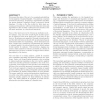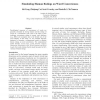151 search results - page 19 / 31 » Cross-Cutting Models of Lexical Semantics |
ACL
2011
13 years 18 days ago
2011
Unsupervised vector-based approaches to semantics can model rich lexical meanings, but they largely fail to capture sentiment information that is central to many word meanings and...
ER
1995
Springer
14 years 16 days ago
1995
Springer
We describe a (meta) formalism for defining a variety of (object oriented) data models in a unified framework based on a variation of first-order logic. As specific example we use...
SIGLEX
1991
14 years 14 days ago
1991
A computationally relevant theory of lexical semantics must take into consideration both the form and the content of three different static knowledge sources -- the lexicon, the o...
IWRIDL
2006
ACM
14 years 2 months ago
2006
ACM
We present the state of the art of a computational platform for the analysis of classical Sanskrit. The platform comprises modules for phonology, morphology, segmentation and shal...
FLAIRS
2011
13 years 14 days ago
2011
Psychological measures of concreteness of words are generally estimated by having humans provide ratings of words on a concreteness scale. Due to the limits of this technique, con...


